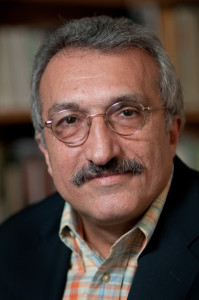
Allen S. Weiner, Professor of Law, is director of the Stanford Program in International and Comparative Law and co-director of the Stanford Center on International Conflict and Negotiation. Dr. Abbas Milani is a Hoover Institute research fellow and a director of Iranian Studies at Stanford. The Daily recently sat down to talk with Milani and Weiner to shed light on the current state of nuclear negotiations with Iran.
The Stanford Daily (TSD): How close are we to a deal between Iran and P5+1 countries?
Milani: There are some discrepancies on what the Iranians have agreed to and what the U.S. believes they have agreed to. But, in my view, most of that is posturing. They seemed to have agreed to a framework and are now working to translate it into an actual agreement over the next few weeks. I’m cautiously hopeful it will work out.
Weiner: There is an old saying that the devil is in the details … It’s not a foregone conclusion that a deal will get done. The trickiest issues are the timing of sanctions relief, the scope of inspections and the question of whether Iran will disclose previous weaponization-related activities, which they have been thus far been unwilling to disclose to the IAEA (International Atomic Energy Agency).
TSD: How difficult will it be for President Obama to sell this deal to the Republican Congress? Similarly, how will Rouhani sell this to the conservative elements of the Iranian government?
Milani: My sense is that there are two serious obstacles. One: how fast the sanctions will be removed. The Iranians want it immediately; I don’t think Obama can promise that. Two: whether U.N. monitors will be allowed to … potential sites of nuclear research. Everything else, I think they more or less know what they will agree to. On the U.S. side, the Republicans can certainly make it very difficult, but the president generally has a lot of room to maneuver when it comes to foreign policy.
Weiner: This is a classic example of a two-level game. There is a negotiation between the states, but it has to be ratified at the domestic level. Both Iran and the United States have limited room for maneuver due to powerful domestic groups who think their negotiators are making concessions that go too far.
TSD: To what extent will this deal allow for better relations between Iran and the West, particularly the United States? Is it possible that Iran and the United States could cooperate on issues like ISIS?
Milani: In the case of ISIS, they already cooperate, but its not publically declared. In Khamenei’s speech, he essentially gave the green light to talk on other issues. Mr. Zarif, the foreign minister, followed this by writing an op-ed in The New York Times saying, we are open to talks on any issue. They want immediate sanctions relief, but they are also worried about ISIS. ISIS is not to be taken lightly.
Weiner: I think it would almost certainly be the end of the prospect of an agreement if anyone made that linkage explicit. There remains so much concern on each side about the nefarious practices of the other that the minute you say, this is part of a rapprochement, people on both sides will be alarmed. If the leaders can sell the agreement, it will be on very narrow terms.
TSD: What is popular opinion in Iran regarding the negotiations?
Milani: Radicals in Iran have lambasted the deal as being one of the most embarrassing and lopsided deals. But nevertheless, by one account, 90 percent of the population wants a deal, as they are sick and tired of the economy.
Weiner: The Iranian people, I think, have been persuaded by their government that they are entitled to a peaceful nuclear program, which their government is telling them is all they want to pursue. Any restriction on that could be seen as unpopular. However, immediately after the interim deal was announced, people were celebrating in Tehran. I think most of the Iranian public wants an end to their isolation and international estrangement.
TSD: Can we trust the Iranian regime to abide by the promises and commitments made in the deal? If Iran does not abide by the restrictions, how difficult will it be to re-impose sanctions?
Milani: It would be almost impossible to re-impose the sanctions. I can’t imagine Russia in this current mood agreeing to that. I can’t imagine China doing it. I think part of the calculation of the Iranians is exactly that. They say, we will have a deal, or a semblance of a deal, and if by any reason it fails, we have already accomplished breaking sanctions. I don’t think this regime is capable of genuine behavior.
Weiner: It is not a foregone conclusion that the Iranians will comply or that they will breach. I do think it is a genuine risk though. I think the Iranians are very tactical, sometimes at the expense of being strategic. I think if they breach, it will be very small nickel-and-dime cheating so they can lie and say they thought it was consistent with the agreement. It will thus be very difficult to rally international support … I think the administration’s talk of the sanctions snapping back is mostly bluster. In general, I think it would quite a challenge to recreate the sanctions regime that exists now.
Contact Zachary Brown at zbrown ‘at’ stanford.edu.